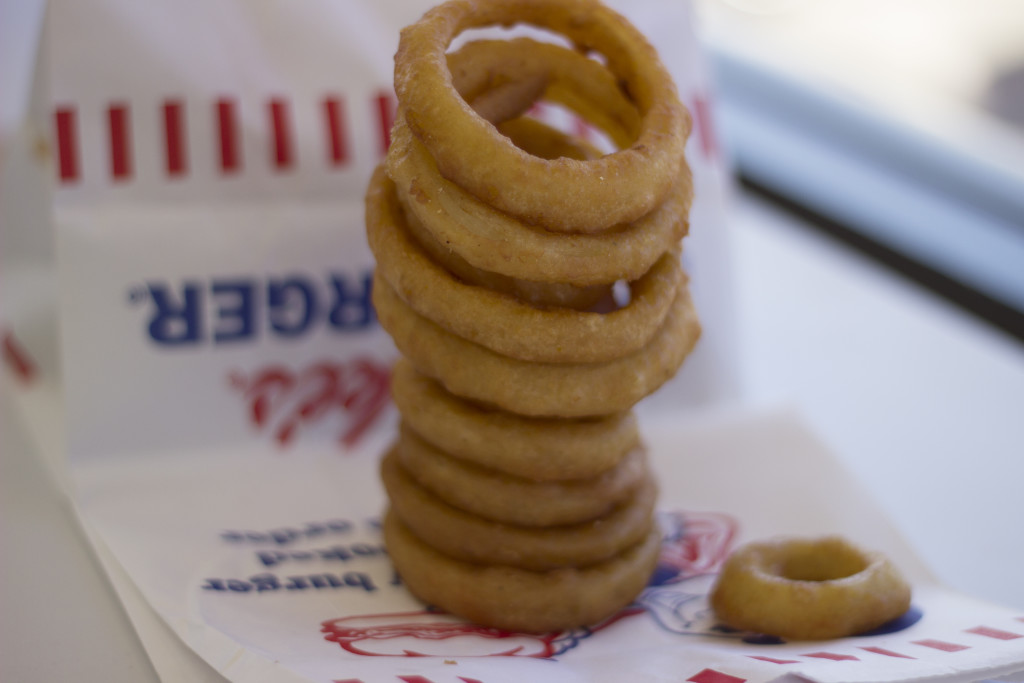On Love and Onion Rings
A derelict restaurant in a forgotten corner of the West: a single dim room with a silent jukebox and a few solitary drunks at the bar. The only sound is the soft slow mutter of conversation and the occasional hiss of onion rings in the deep fryer. A huge TV fills the back corner and its smooth black frame and neat angles are entirely out of place in the parade of taxidermied elk heads that circle the room. It’s dusty though and might not even be plugged in.
Most of the tables aren’t open to the public at lunchtime. The big one directly inside the door with the video slot machines on one side and massive moose antlers looming above it, that belongs to five old men, two of whom must be twins. They arrive every day at quarter to noon wearing once-white shirts, faded jeans, and stained beards. They always sit in the same order, and the waitress doesn’t need bring them menus. The tables around them are always left respectfully empty. An ancient woman sits in the corner in a formless sunbleached dress, drinking gin. The glass leaves circles of condensation on the table; the coaster sits dry between the saltshaker and the ketchup. Around her, too, are empty tables.
We have our table, and so do Bob and Alice.
*
They entered at noon and paused, waiting for Bob’s eyes to adjust. Alice just stared straight ahead, squinting. Their arms were entwined, her hand in his. He led her to the table with the tortured gait of someone too proud for a walker and too old to walk. He eased her into the seat against the wall and sat down beside her. The waitress came over. Hi Bob, what can I get you two today? Bob told her something and listed a few choices for Alice. She let out a short grunt and Bob relayed this to the waitress.
He then turned to Alice and tucked her napkin into her collar. She didn’t move. She was staring with vacant eyes toward something outside the building, inside her head. The waitress brought a coke and a water. Bob thanked her and slid the water in front of Alice. Her left hand appeared, groped around the table, found the glass, wrapped itself around it, twitched. The body under her formless flower print dress shuddered, stuttered, slave to a failing basal ganglia and an irreversible decline in dopamine. Her mouth hung open and a quiet moan escaped. Bob took her hand in his and steadied it around the glass. With his other hand he pushed a straw from its paper wrapper, placed the paper neatly next to his plate, placed the straw in the water and guided it to her lips. Their food arrived a few minutes later and Bob took one bite from his burger and turned to Alice’s meal, cutting it into small pieces. He gave her the fork but her hand was shaking too badly so he fed her, speaking gently as he did.
The conversation at our table wound back towards me and I turned away. Thinking: If only I can be that lucky. If only I can spend some fleeting years in that perfect form, participate while I can, watch it bloom like a rose (of course it’s a rose), watch it encompass all that I am, and hopefully die before it does. If only I can be that lucky.
When their meal was over Bob wiped his mouth and scooted back his chair. He stood and put his green hat back on. Then he took her hand and she turned and he helped her to her feet. Her hand fluttered, found his side, wrapped itself around his arm. One of the old men at the front table stood and held open the door. Together they walked slowly into the light, a beautiful collusion of chance and circumstance, each to the other their world entire. Then the door creaked shut and it was dark, and smelled of onion rings.
*
The onion rings, and maybe also the elk heads, and six years changed my mind: there is no Love, only love. There is no remote perfection manifested in our actions while existing beyond and without us. Love isn’t an abstraction evinced in small gestures, it is the small gestures. It is imminent and alive, inseparable from the sordid details of common existence. The onion rings do no heighten the portrait of devotion; there is no real contrast between beautiful acts and a grimy stage.
Connor Wood has nearly completed a Masters in Wildlife Ecology, and is leaving New England after nine years. This is his first non-fiction publication; his fiction will appear in a forthcoming issue of Zeit|Haus. Connect via @connormmw.
